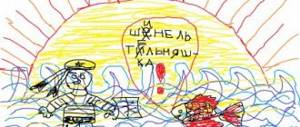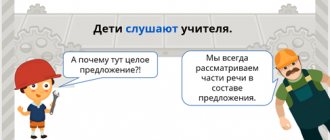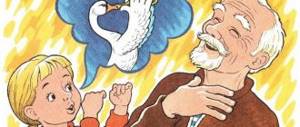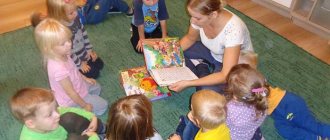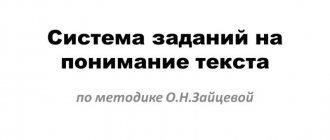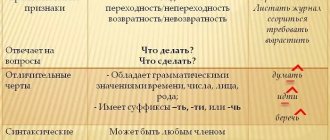The Russian language at school can, perhaps, be considered one of the most important subjects, ignorance of which can leave a serious imprint on a person’s future life. But how to increase children's interest in it? How to make it easier to understand such difficult and confusing rules at first glance? Regular publication of a school newspaper dedicated to the Russian language will help with this. Interesting facts, funny stories of the origin of words, “blunders” from essays - all this will come to the rescue and make Russian a truly native language for students.
What can a wall newspaper tell you about?
A school wall newspaper dedicated to the Russian language should become not just a statement of facts, but also a way of communication. Let students ask questions, leaving them in a special pocket, bring their notes (you can introduce some kind of encouragement for such activity) and participate in competitions.
Thus, in the “Entertaining Russian Language” section you can provide the following information:
- Did you know that in the Russian language there are animate neuter nouns: “child”, “animal” and “monster”?
- The only complete adjective in the Russian language that has one syllable is the word “evil”.
- The verb “take out” is the only word in our language that does not have a root. It is considered that it is zero here and alternates with -it (take out - take out).
In addition, you can publish a kind of test:
“Any foreigner who claims to know the Russian language perfectly can be tested. Invite him to translate the following sentence (I wonder if you yourself will understand what it is about?): “Mowed with a scythe.” And if a foreigner ends up saying something like: “A man with a visual impairment cut the grass with a crooked tool,” then he can truly be considered an expert on the “great and mighty.”
But at the end of these notes, don’t forget to ask: “Do you know any fun facts like this?” This will stimulate children's interest in reading and create the beginning of communication.
Interesting poster on the Russian language for elementary school
A huge hello to everyone, everyone, everyone, both big and small! My name is Evgenia Klimkovich and I am glad to welcome you to the pages of the ShkolaLa blog! Today I decided to leave the “summer” topics alone for a while and post an article in the “posters for school” section. The school year is not soon yet, but, nevertheless, it will begin someday, and this article may be useful to you.
Without undue modesty, I will say that we are real experts when it comes to posters. We make them beautiful, interesting and a little interactive. That is, you can not just look at and read them, you can play with them! I already told you about the poster for Maths Week here. And today I will show you a poster on the topic of the Russian language. We made it when my daughter Alexandra was in 1st grade. But I think that it is quite suitable for 2nd grade. And for Russian language week, such a poster is absolutely what we need!
It's called "Attention!!! Letters!" and it looks like this.
Done on a whole sheet of whatman paper. They drew with pencils and felt-tip pens. Along the edge, instead of a frame, we decided to draw block letters. They follow each other, like in the alphabet. The same letters separate different areas of the poster. And there were five zones in total. Now in more detail about each of them.
Zone 1. It's called "Detective".
The yellow rectangle says:
"Attention! A detective is urgently needed to find the alphabet in this room."
The picture shows a room that at first glance is ordinary, but in this room the letters of the alphabet are hidden. These are the ones you need to find! For example, the letter “o” is a mirror. One of the chairs near the table is “b”. And the vacuum cleaner looks suspiciously like “s”) We came up with the room ourselves. A very exciting process, especially for my daughter, who was wondering where to hide which letter.
Zone 2. Called “Wizard” (it’s on the left in the picture) and zone 3, called “Knowledgeable”.
In zone 2, a small wizard is drawn, and in a yellow rectangle it is written:
"Attention! We urgently need a wizard to turn two small words into one big one.”
The task is to make one word out of two words. To make it clear for children, an example is given.
In zone 3, Znayka is drawn and there is the following inscription:
"Attention! We urgently need Znayka to solve complex riddles."
The riddle is poorly visible in the photo. Therefore, I was not too lazy to display them for you in separate images (along with hints and correct answers).
Riddle No. 1.
Riddle No. 2.
Riddle No. 3.
Zone 4. "Policeman". I had to tinker with this area)
Inscription:
"Attention! A policeman is urgently needed to restore order in words."
Notice to the left of the police figure the words:
- ipnesla;
- atsomac;
- I'm thinking;
- Loshka.
“What kind of words are these? There are no such words! - you will say and you will be right. The letters in these words are simply rearranged. The letters are not written on whatman paper. They are written on small cards that have frames of different colors, so as not to confuse which word is which letter. And these cards are inserted into transparent pockets. They can be removed and swapped.
I made pockets from textbook covers. I simply cut out strips 4.5 cm wide and sewed them directly to the Whatman paper with ordinary strong threads. Well, I used vertical seams to divide these transparent strips into separate pockets. The design turned out to be quite durable; nothing happened to it in 4 years.
This is how the letters are placed correctly!
Well, the last zone 5. “Trainer”.
You see the trainer, and the inscription reads:
"Attention! We urgently need a trainer who will teach the syllables to stand in their place.”
The principle of making this zone is the same as in the case of a policeman. But here the syllables have already learned to stand in their places.
I can say that this poster invariably attracted flocks of little schoolchildren who imagined themselves as detectives, police officers, Znaykas, wizards or trainers and tried to cope with tasks while playing. And at the same time we deepened our knowledge of the Russian language!
Friends, I hope that the information will be useful to you and will help you create with your own hands not just a wall newspaper for an elementary school, but a real miracle, so that both the teacher and classmates will simply gasp in admiration!
Well, right now I suggest you gasp in surprise! Watch the video and learn new interesting facts about our native great and mighty Russian language, which, by the way, can also be used in posters for school.
We also have an interesting poster on ecology and other subjects, you will find them in the “Posters for School” section.
I wish you all the best!
Always yours, Evgenia Klimkovich.
Information that a wall newspaper can tell about
A school wall newspaper can become a collection of amazing facts. Like these, for example:
- all obscene words before the 14th century. in Rus' they were called “absurd verbs”;
- in the Russian language there is a word consisting of 46 letters - “thousand-nine-hundred-eighty-nine-millimeter”, and the longest preposition and at the same time the longest conjunction is the word “respectively” consisting of 14 letters;
- and the word “darkness” used to be a numeral denoting the largest known quantity – 10 thousand.
No less interesting will be the information for the “Entertaining Russian Language” section about nouns with “dropping out” vowels. If you decline words such as louse, day, lion, forehead, lie, stump, ditch, rye, sleep, seam, etc., then not a single vowel will remain in their roots. And since not all words are listed, you can invite readers to add to this list.
Development of a Russian language lesson on the topic “Writing notes for a school newspaper.”
ma:8.Writing notes for the school newspaper.
Topic: Writing notes for the school newspaper.
Objectives: a) educational – repeat material on stylistics; b) developing - developing the student’s ability to self-determinate in the modern information space, developing the skill of writing notes in the school newspaper, developing communication skills, and creative abilities of children; c) educational – instilling interest in the Russian language, moral and aesthetic education. During the classes. I Mobilizing beginning of the lesson. Subject message. II Repetition: a) types of speech; b) speech styles; c) genres of journalistic style. — Usually there are three groups of genres:
— informational (note, report, interview, report);
- analytical (conversation, article, correspondence, review, overview, review) and
- artistic and journalistic (essay, sketch, feuilleton, pamphlet) III Work on the topic. 1. Introductory speech by the teacher.
Note in the newspaper A person needs comprehensive information to navigate the world.
It helps him learn about the existence of certain phenomena, assess their significance, and determine possible options for his own actions. NOTE - a brief summary or description of a phenomenon, event, person, problem. The following requirements are imposed on the note: efficiency, relevance, accuracy, brevity, clarity of presentation. Information note. The basis of an information note is a description of the facts. This is a sequential presentation of answers to the questions: what happened? Where? When? Why? How?. The answers to these questions constitute the structural elements of this type of note. NOTE
- a newspaper genre, a short message that states a fact or poses a specific question.
The great and kind writer Antoine de Saint-Exupéry wrote in one of his books: “The only effective weapon is self-sacrifice.” Self-sacrifice is the foundation of heroism, love, and true friendship. About myself - last of all. This is a very big concept, one of the highest - self-sacrifice. It rarely occurs in everyday life. But kindness, generosity, responsiveness - this has a place in every day of human life. Today we will try ourselves in the role of a correspondent. 2. Analysis of educational material.
TO INHALE OR NOT TO INHALE? Measurements carried out in ten schools showed the following. In a classroom with a standard area (50 sq. m), where there are about 30 children and a teacher, with the windows and doors closed, after 20 minutes the concentration of carbon dioxide increases 4 times compared to its content in the atmosphere, i.e. outside the room. By the end of the 45-minute lesson, the concentration reaches 0.3%, that is, it increases 8 times. (Based on materials from periodicals). This is an evaluative information note - a note that not only describes a fact (what happened? where? when? why? how?), but also evaluates this fact. The assessment represents the journalist’s attitude towards the phenomenon or subject described in the article. Therefore, the structure of the evaluation and information note looks more complex. A journalist not only describes a phenomenon or event, but also reminds the audience of a well-known truth. A generally valid judgment can be found either at the beginning of the note or at the end. Thus, if we add a comment to the above note about the well-known truths about the need to ventilate the room, the benefits of fresh air, etc., the note will acquire an evaluative and informational character. To attract the reader's attention to a note, the author often gives it an intriguing title or uses an unusual phrase, often of a polemical nature, in the opening sentence. Give thanks for purity? You will often observe how students at school treat technical workers with disrespect. Of course, being a cleaner is not a prestigious job, but this does not mean that it is not needed and not worthy of honor. Let's imagine that we are left without technical equipment. What will school look like at the end of the day? What will the air be like without wet cleaning? I recently learned that abroad cleaners are proudly called saviors of garbage.
Amazing letter "Ъ"
The history of the 28th letter of the Russian alphabet “ъ” is complex and confusing and may also become the topic of one of the newspaper issues.
In the old days, it denoted some very short vowel sound, which linguists are still arguing about. Later, from about the middle of the 12th century, it was used to break words into syllables, and a line into individual words, until the widespread transition to the use of spaces (to God's chosen king) took place.
But even after spaces appeared between the words, the rule remained in Church Slavonic writing: “ъ” is the letter indicating the end of the word. That is, every word in the Russian language could previously end only with a vowel, й, ь or ъ (pawnshop, address, grocery store). Imagine, writing this absolutely unnecessary sign took up to 4% of the text!
Now, as a result of the Russian spelling reform carried out in 1917-1918, a new rule has appeared: the unpronounceable “ъ” is a letter that is used only as a dividing mark between a consonant and a vowel. It can be found at the junction of a prefix and a root (congress, embrace, corrosive, etc.) or to indicate the iotized pronunciation of vowels in borrowed words (injection, adjutant, etc.).
But, of course, this is not all that can be said about the solid sign.
School newspaper for Russian Language Day
The newspaper was released by June 6, 2020.
The issue is dedicated to Pushkin Day, Russian Language Day
Russian Language Day occupies a special place in the calendar of significant and memorable dates. It is celebrated on the birthday of the great Russian poet, creator of the modern literary language, classic of Russian and world literature, Alexander Sergeevich Pushkin. His poems, poems, fairy tales, stories accompany us all our lives, many of them we know by heart from early childhood.
Language is the history of a people, the path of civilization, therefore studying and preserving the Russian language is not an idle activity, but an urgent necessity. The Russian language is beautiful and expressive. There are no sounds, colors, images and thoughts for which there would not be exact definitions and intonations in our language. These wonderful qualities of the Russian language were noted by many classics of literature.
Today, Russian is one of the most widespread languages in the world - both in terms of the number of people who speak it, and in terms of its use as an international communication, and even in terms of popularity on the Internet. For us, this is the state language, a national treasure, a carrier of spirituality and rich culture. Therefore, we must treat it carefully and responsibly.
The Russian language does not use the verb “to be” in the present tense. But in the future and past it is used.
In the past tense, verbs have a gender, but in the present and future, they do not. He played, she played, he played, she played.
The Russian alphabet is strange in itself. Some letters in it are exactly the same as in Latin, but others look the same but sound completely different. And two more letters - “ъ” and “ь” — do not have their own sounds, why are they needed at all?
Russian nouns have “animacy”! This means that some "animate" nouns are considered more animate than inanimate ones. For example, in Russian “dead man”
considered more alive than
a "corpse"
.
(We remember the school curriculum: I blame someone - a dead man, but I blame something - a corpse
).
Numerals 1 and 2 have a gender, but the rest do not. One boy, one girl, two girls, two boys,
but
three boys/girls.
The numeral 1 has a plural ( one
).
How to correctly say which option to choose, “one slipper” or “one slipper” ?
The word "sneakers"
According to the morphological norm of the modern Russian language, the singular form is the noun
“slipper”
, which has a feminine category:
Let's say it correctly:
- one slipper;
- red slipper;
- worn out sneaker.
"No shorts" and "no shorts"
— both word forms of the genitive plural of the noun
“shorts” are equal in the modern Russian language.
The word "shorts"
denotes an object and answers the question:
what?
This is a noun borrowed from English (English short
-
“short”
) means pants that are shortened to the knees. In Russian, it has a grammatical plural form and is declined only in the plural, like similar names for paired items of clothing:
- trousers,
- trousers,
- jeans,
- trousers.
Between the eyebrows or eyebrows?
Both case forms
The plural form of the word “brow” with the preposition “between”
exists in Russian speech.
But, we repeat, in strict literary speech or in the written form of a language, it is preferable to choose the instrumental plural form “between the eyebrows” as normative .
Words with 6 consonants in a row
: “adjunction”, “burgomastership”, “counterstrategy”, “ro; "to kick up"
Words with a group of 6 letters consisting of consonants and a soft sign in a row
: “heraldry”, “filterpress”.
Two letter word
, in which you can make
8 mistakes
-
cabbage soup.
The Russian Empress Catherine the Great, while still a German Princess Sophie, wrote the simple Russian word "cabbage soup"
like this: “schtschi”, and these are 8 letters, all of which are incorrect!
The longest words in the Russian language:
“Tetrahydropyranylcyclopentyltetrahydropyridopyridine” (55 letters, chemical substance)
“Hydrazinocarbonylmethylbromophenyldihydrobenzdiazepine” (50 letters, tranquilizer Gidazepam)
“Cocamidopropylpropylene glycoldimonium chloride phosphate” (48 letters, chemical substance)
“methoxychlorodiethylaminomethylbutylaminoacridine” (44 letters, chemical substance, another name is quinine)
· “four hundred and fifty-seven millimeter” (37 letters, gun barrel)
Word with 5 vowels in a row
: “Chihuahua” (a breed of dog), this same word has a record consonant/vowel ratio of 1/5.
Words with 4 vowels in a row
: “meteorological bulletin”, “radio air navigation”, “radio audience”, “laueit”.
A word in which there are two groups of 3 vowels in a row: “hydroaeroionization.”
Let's talk about suppletives
It is not necessary to collect interesting facts about the Russian language for a wall newspaper “from the world.” After all, even a completely scientific phenomenon from the field of linguistics can turn out to be surprising and entertaining for the average reader. For example, suppletives.
Each native speaker can easily form the past tense from any verb:
- write - wrote,
- read - read,
- do - did,
- sing - sang,
- go - ... walked.
This “strange” discrepancy between the root of the initial and derivative form is called suppletive. The same phenomena occur when forming the comparative degree of some adjectives:
- funny - funnier
- smart - smarter,
- warm - warmer,
- good - ... better or bad - ... worse.
The same can be found in nouns, for example, in the word “man” (its plural is “people”, formed from another root), in the pronoun “I” (its indirect cases “me”, “me”, etc. . also have a different root).
How a hooligan appeared in Russia
A school wall newspaper on the topic: “The Russian language and its history” can successfully publish interesting facts about the origin of some words. Here is an example of a short note about how the word “hooligan” appeared in the Russian language.
It’s no secret that a hooligan is a person who indulges in outrages and does not respect the law, but the fact that this word was previously an English surname is probably few people know.
Yes, yes, at the turn of the 18th and 19th centuries. In England, in the city of Southwark, there lived a most unpleasant family engaged in banditry and robbery. They all bore the same surname - Khaligan. And soon they became sadly famous throughout England. And about the head of this robber clan, Patrick Haligan, there was even a mocking song composed, which over time became popular throughout Europe. Caricatures were drawn of the Khaligans, parodies were written, and their surname gradually became a household name, not only in England, but also in Russia, where, however, it was somewhat modified.
Event Planning
The teacher must request performances from his class in advance so that the artistic director can include them in the script for the first day. In order to interest students, the action must take place in a playful way. Each class can come up with a name related to the Russian language and a motto. The opening of Russian language week in elementary schools can begin with a greeting to the teams.
On the first day of the general holiday, children gather in the assembly hall and begin an exciting journey to the country of the Russian language. To ensure that the children do not get lost in it, the leader of each class gives a map of movements to the commander of each class. Here are all the events and competitions that will be held during the week. Next, in order to return the attention of children absorbed in the map, the presenter can play a game with the audience. After this, each class will show their numbers, read poetry, present themed songs to the audience, and perhaps dance numbers will be shown. Next, the school administration can give a parting speech and dismiss the children into classes to pass the first test marked on the map.
Contradictions in the same word
Interesting facts about the Russian language for a wall newspaper can be selected in huge quantities. Schoolchildren will probably be curious to learn about such an amazing phenomenon in the development of our language as enantiosemy - polarization of the meaning of one word. That is, in one lexical unit meanings can contradict and be opposed to each other. Judge for yourself - the well-known word “priceless” contains two concepts at once:
1) something that has no price;
2) something that has a very high price.
What does a person mean when he says, “I listened to the lecture”? That he listened carefully to her or, conversely, that he never heard anything? The verb “listen”, as you can see, is its own antonym.
How did enantiosemy arise?
Interesting facts about the Russian language for a wall newspaper may include the history of this phenomenon.
Linguists explain it by using the word in different areas, for example, in colloquial speech and in book language. Something similar happened with the word “dashing.” If in ancient Russian manuscripts it had only one meaning: “bad, nasty” (dashing person), then in common parlance “dashing” also became “brave, daring” (dashing warrior).
The thing is that in ancient times they most often spoke of robbers as dashing people, capable, as everyone knows, of bold, risky and reckless actions. This is where the new, opposite meaning of the ancient word originated.
The Russian language is rich in examples of enantiosemy of words. You can remember the following: borrow (borrow - lend) or probably (certainly, definitely - maybe not exactly).
The wall newspaper can present facts about how the great Russian language developed both in the form of short notes and as popular science articles.
Wall newspaper on the Russian language, material on the Russian language on the topic
If you want to argue with fate, If you are looking for joy in a flower garden, If you need solid support - Learn Russian! He is your great, mighty mentor, He is a translator, He is a guide. If you take your knowledge to the next level, learn Russian! The Russian word lives on the pages of the World of Inspiring Books. The Russian word is the lightning of freedom. Learn Russian language!
They will ask me: what is like the sea? Russian language – I won’t hesitate to answer. It, like the sea, will warm you in winter, Give you freshness in dry summers, Its waters, overflowing without edge, Shine with unfading sunlight, Waves roll with warm greetings to good people in distant countries. The Russian language is a boundless sea...
Complex tongue twisters
From the clatter of hooves, dust flies across the field. Then they sent Senya with a report. Senya has a head like a basket, but not a crumb of intelligence. He galloped to the end, but he told everything wrong: he said that not thirty-three ships tacked, tacked, but didn’t tack, that Prokop didn’t cook his dill, but ate all the whey from Malasha’s yogurt and even a mushroom pie to keep his tongue for teeth. Prokop held on, and Senya kept chatting and chatting, and took a nap. I didn’t take a nap, I snored and whistled.
6 words in one
Try to come up with a 9 letter word that contains 6 other words. In this case, you cannot rearrange letters in a word or add letters that are missing in it. Answer:
The word INVENT, which you have already read twice, contains the words: GO, THINK, THOUGHT, MIND, MOTHER and MAT.
Create a menu for lunch, provided that all consonants in the names of the dishes are hard:
salad, mashed potatoes, pie, cutlet, jelly, borscht, fish soup, compote, stew, bun, pancakes.
How to say it in one word?
- Hang your nose -
- To distant lands -
- To kick the bucket -
- Lead by the nose -
| ) Homophones: meadow and onion - Only the same sound; Labor and tinder, mouth and clan, Carcass and carcass, raft and fruit - The writing is different - The sound is the same, the faces are different! | 2) It was the moat with water that helped strengthen the castle, not the castle... So with the “homograph” - I decide: “I write the same way”! (There are shelves and shelves, And pegs and pegs, There is flour and flour, That’s all science...) |
| 3) The OVEN is briskly blazing with heat - It’s time for us to BAKE the pies. The blizzard has subsided, the wind has VERSE, the VERSE has been written to the end - There is no secret in this: These are Omoforms! |
HOMONYM has three names - it’s so important!
One, of course, are “homophones”, Two, without a doubt, “homoforms”, Three – “homographs” (you can only distinguish them by stress)… It’s easy to understand them: “Same name”!
Choose synonyms for adjectives:
- Quiet ride -
- Quiet night -
- Quiet voice -
- True friend-
- The correct answer is
- Strong rope-
- Strong tea-
- Strong body
Make up a word if it contains
- Root - from the word sailor
- The ending is from the word winter
- Prefix - from the word fly
- Suffix - from the word Russian
What words can be classified as different parts of speech?
Roy, my, close, simple, oven
Which words have the same number of letters and sounds?
Lighthouse, volume, sad, south, singing, surrounding, anchor, story.
A few more final tips
The newspaper discussed in the article should become both fascinating reading and a source of thought-provoking information for children of all ages. Interesting facts about the Russian language for wall newspapers can be found in large quantities in the media, especially now that interest in the native language has risen to a higher level.
But once again I would like to remind you that such a newspaper is not just an informative publication, but also a place for communication. Only in this way will interest turn from purely contemplative into something more real, leading to a passion for the subject, and perhaps even to the discovery of the talent of a writer, poet or artist. Good luck!
Preparation of posters
The children, together with their parents, will have to draw a poster with statements about the Russian language. Assignments will need to be handed out in advance. This way the child will feel more confident and will be more willing to take part in competitions and activities. The teacher can tell moms and dads about the upcoming event at the meeting. The right attitude on the part of parents is very important for the child. Children must understand that Russian language week in elementary school is not for teachers, but for students. The main task of this event is to assess the children’s knowledge. In addition, the joint activities of students, teachers and parents contribute to the unity of the school community.
What should a Russian language week be like in elementary school? Activities can have different directions. A whole holiday is organized for children. The week of the Russian language in primary schools begins with the opening. Students bring previously prepared posters that decorate the assembly hall and classroom. By this day, kids must prepare numbers from each class. This can be a solo or group performance. Children can learn one large poem, dividing its reading into parts among themselves, or choose one reader who will speak from the group.
